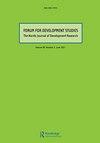Environmental governance in rural India: diffusion of solar powered irrigation technologies
IF 1.1
Q3 DEVELOPMENT STUDIES
引用次数: 5
Abstract
Abstract Developmental actors are pushing the diffusion of solar powered irrigation technologies using different technology diffusion models in resource-constrained, underdeveloped agrarian regions of the Global South. Among the varied models, the hybrid model of technology diffusion and environmental governance has gained a lot of traction and support among the technology promoters in recent years. In this article, we analyse two cases of hybrid environmental governance employed for the diffusion of solar powered irrigation technologies in rural Bihar, India. The promoters of solar powered irrigation technologies wish to achieve environmental sustainability, enhance farmers income and mitigate climate change through promoting renewable-based technologies. The top-down framing of technology and environment in hybrid environmental models often uncritically negates the place-based embedded experiences of end-users and non-users. The paper argues that the role of end-users and non-users in hybrid environmental governance need to be understood using the bottom-up approach. The paper makes a case for acknowledging and incorporating the views and environmental subjectivities of end-users and non-users while planning developmental interventions. The paper ends up suggesting a few policy-relevant suggestions for hybrid models of technology and environmental governance.印度农村的环境治理:太阳能灌溉技术的推广
摘要发展行动者正在全球南方资源有限、欠发达的农业地区使用不同的技术扩散模型推动太阳能灌溉技术的扩散。在各种各样的模式中,技术扩散和环境治理的混合模式近年来在技术推动者中获得了很大的吸引力和支持。在这篇文章中,我们分析了在印度比哈尔邦农村推广太阳能灌溉技术的两个混合环境治理案例。太阳能灌溉技术的推广者希望通过推广可再生技术实现环境可持续性,提高农民收入,缓解气候变化。混合环境模型中自上而下的技术和环境框架往往不加批判地否定了最终用户和非用户基于地点的嵌入式体验。该文件认为,需要使用自下而上的方法来理解最终用户和非用户在混合环境治理中的作用。该文件提出了在规划发展干预措施时承认和纳入最终用户和非用户的观点和环境主观因素的理由。最后,本文对技术和环境治理的混合模式提出了一些与政策相关的建议。
本文章由计算机程序翻译,如有差异,请以英文原文为准。
求助全文
约1分钟内获得全文
求助全文
来源期刊

FORUM FOR DEVELOPMENT STUDIES
DEVELOPMENT STUDIES-
CiteScore
1.80
自引率
14.30%
发文量
24
期刊介绍:
Forum for Development Studies was established in 1974, and soon became the leading Norwegian journal for development research. While this position has been consolidated, Forum has gradually become an international journal, with its main constituency in the Nordic countries. The journal is owned by the Norwegian Institute of International Affairs (NUPI) and the Norwegian Association for Development Research. Forum aims to be a platform for development research broadly defined – including the social sciences, economics, history and law. All articles are double-blind peer-reviewed. In order to maintain the journal as a meeting place for different disciplines, we encourage authors to communicate across disciplinary boundaries. Contributions that limit the use of exclusive terminology and frame the questions explored in ways that are accessible to the whole range of the Journal''s readership will be given priority.
 求助内容:
求助内容: 应助结果提醒方式:
应助结果提醒方式:


